New York City. The very name conjures images of towering skyscrapers, iconic yellow cabs, and a relentless, vibrant energy. It’s a destination so vast and diverse that planning a visit can feel like navigating a labyrinth. Where do you start in a city offering a lifetime of exploration? As an expert in travel, culture, history, and experiences, I’ve spent years delving into the heart of this incredible metropolis.
My goal isn’t just to list places, but to help you connect with the stories, the pulse, and the authentic soul of NYC. From world-famous landmarks steeped in history to hidden corners pulsing with local life, let’s explore some of the best tourist attractions in NYC that promise not just sights, but unforgettable experiences.
Iconic Landmarks: Statue of Liberty and Ellis Island
It might feel cliché, but visiting the Statue of Liberty and Ellis Island is an absolute must for anyone exploring the best tourist attractions in NYC. More than just impressive structures, they are potent symbols – Liberty, the universal emblem of freedom, and Ellis Island, the historic gateway for millions of immigrants seeking a new life in America. Standing on Liberty Island and looking up at the Statue, you feel the weight of history and the enduring power of hope it represents. The ferry ride itself offers stunning views of the Manhattan skyline.
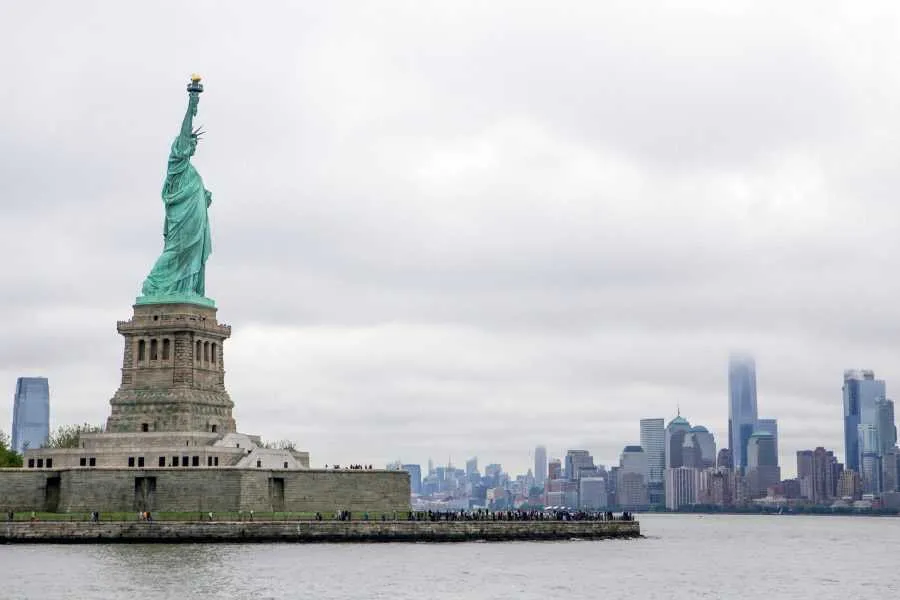 View of the Statue of Liberty, one of the best tourist attractions in NYC, from a ferry passing by
View of the Statue of Liberty, one of the best tourist attractions in NYC, from a ferry passing by
A visit to the Statue of Liberty Museum provides deeper context, and climbing the pedestal (book well in advance!) offers breathtaking panoramas. Just a short ferry hop away, the Ellis Island Immigration Museum is profoundly moving. Walking through the Great Hall where new arrivals were processed connects you directly to the stories of nearly half of all Americans who can trace their roots here. These islands aren’t just destinations; they are living monuments to the American narrative. For a richer understanding, consider a guided tour that brings the history to life with expert commentary.
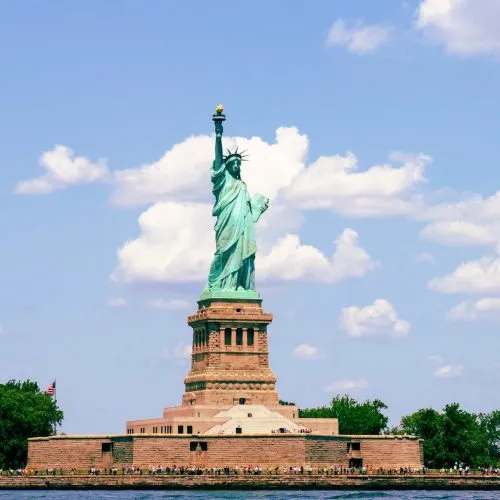 Statue of Liberty on island in NYC as seen from the shore
Statue of Liberty on island in NYC as seen from the shore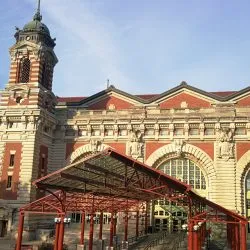 Historic brick building of Ellis Island in New York City
Historic brick building of Ellis Island in New York City
If you’re looking for top nyc attractions, these two sites consistently rank high for their historical significance and emotional impact. Experiencing them firsthand offers a unique perspective on America’s founding ideals and its complex history of immigration.
The Heartbeat of Entertainment: Broadway
The energy of the Theater District is palpable, and experiencing a Broadway show is arguably one of the most electrifying entries on any list of the best tourist attractions in NYC. With over 40 theaters, this district offers unparalleled live performances, from dazzling musicals to gripping dramas. Walking into a historic theater, settling into your seat, and watching a story unfold on stage creates a magical, transportive experience unlike any other.
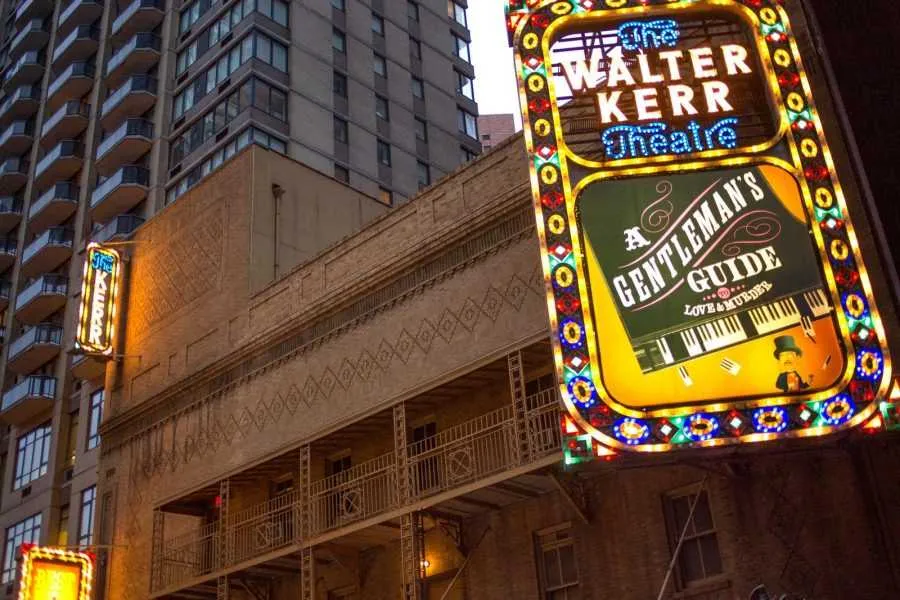 Broadway theater marquee lighting up Times Square at night
Broadway theater marquee lighting up Times Square at night
The history of Broadway is intertwined with the city’s cultural development, evolving from vaudeville and operettas to the sophisticated productions we see today. While ticket prices can be steep, knowing a few insider tips – like visiting the TKTS booth for same-day discounts or exploring apps like TodayTix – can make this iconic NYC experience more accessible. Beyond the shows, the district itself is a spectacle, especially around Times Square with its blinding billboards and constant buzz.
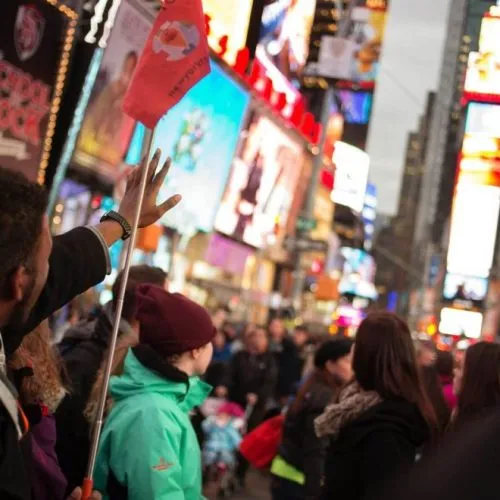 Nighttime view of Broadway street and Times Square lights
Nighttime view of Broadway street and Times Square lights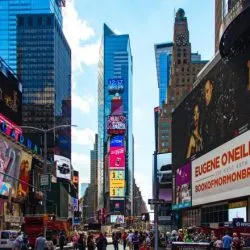 Closeup view of a Broadway theater entrance and marquee
Closeup view of a Broadway theater entrance and marquee
To truly appreciate the legacy and workings of this unique district, consider a tour led by someone with a deep connection to the theater world. Learning the stories behind the curtains and the history of the famous playhouses adds a layer of understanding that enhances the magic of Broadway.
A Walk Above the Water: Brooklyn Bridge
An architectural marvel and a beloved pedestrian pathway, walking the Brooklyn Bridge is a simple yet profound experience and ranks highly among the top tourist attractions nyc. Opened in 1883, it was an engineering feat of its time, connecting Manhattan and Brooklyn across the East River. The design, with its soaring Gothic arches and intricate cable work, is stunning up close.
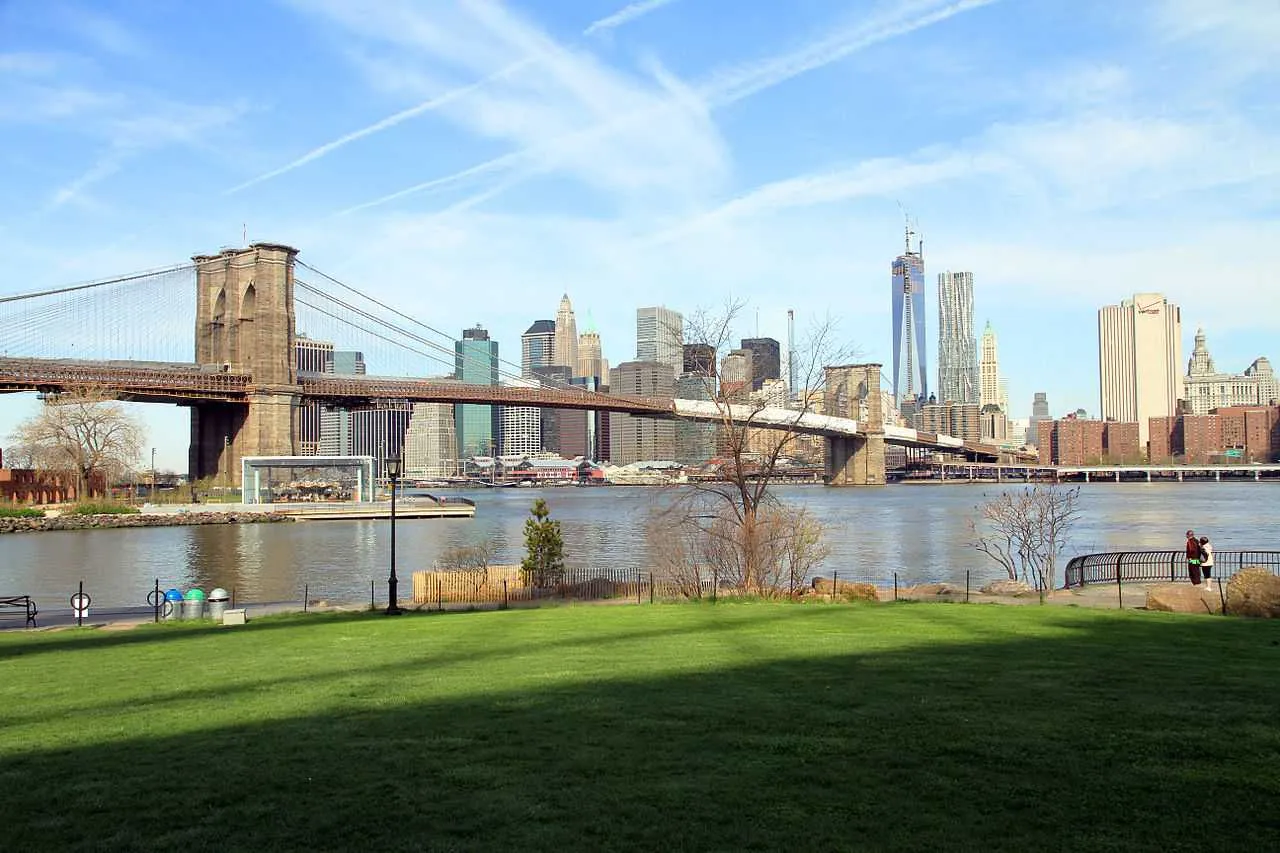 Brooklyn Bridge Park in NYC with view of the bridge and city skyline
Brooklyn Bridge Park in NYC with view of the bridge and city skyline
Choosing to walk from the Brooklyn side towards Manhattan offers increasingly dramatic views of the city skyline unfolding before you. It’s a perspective that photo enthusiasts and casual strollers alike will cherish. The pedestrian walkway is elevated above the traffic, offering a relatively peaceful stroll (though it can get crowded). The experience allows you to appreciate the scale of the bridge and the dynamism of the city from a unique vantage point.
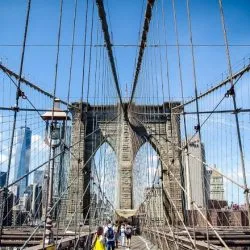 View of the Brooklyn Bridge with cars and people on the walkway
View of the Brooklyn Bridge with cars and people on the walkway
For an extra special experience, time your walk for sunset. Watching the Manhattan skyline transition from day to twinkling night lights from the middle of the bridge is truly magical and provides ample opportunities for stunning photographs.
Reaching for the Sky: NYC Observation Decks
New York City’s skyline is world-famous, and experiencing it from above is an essential part of visiting the best tourist attractions in NYC. The city boasts several incredible observation decks, each offering a different perspective and experience. The classic views from the Empire State Building and Top of the Rock provide iconic postcard scenes. The newer One World Observatory offers sweeping views from the tallest building in the Western Hemisphere, with a focus on the downtown area and harbor.
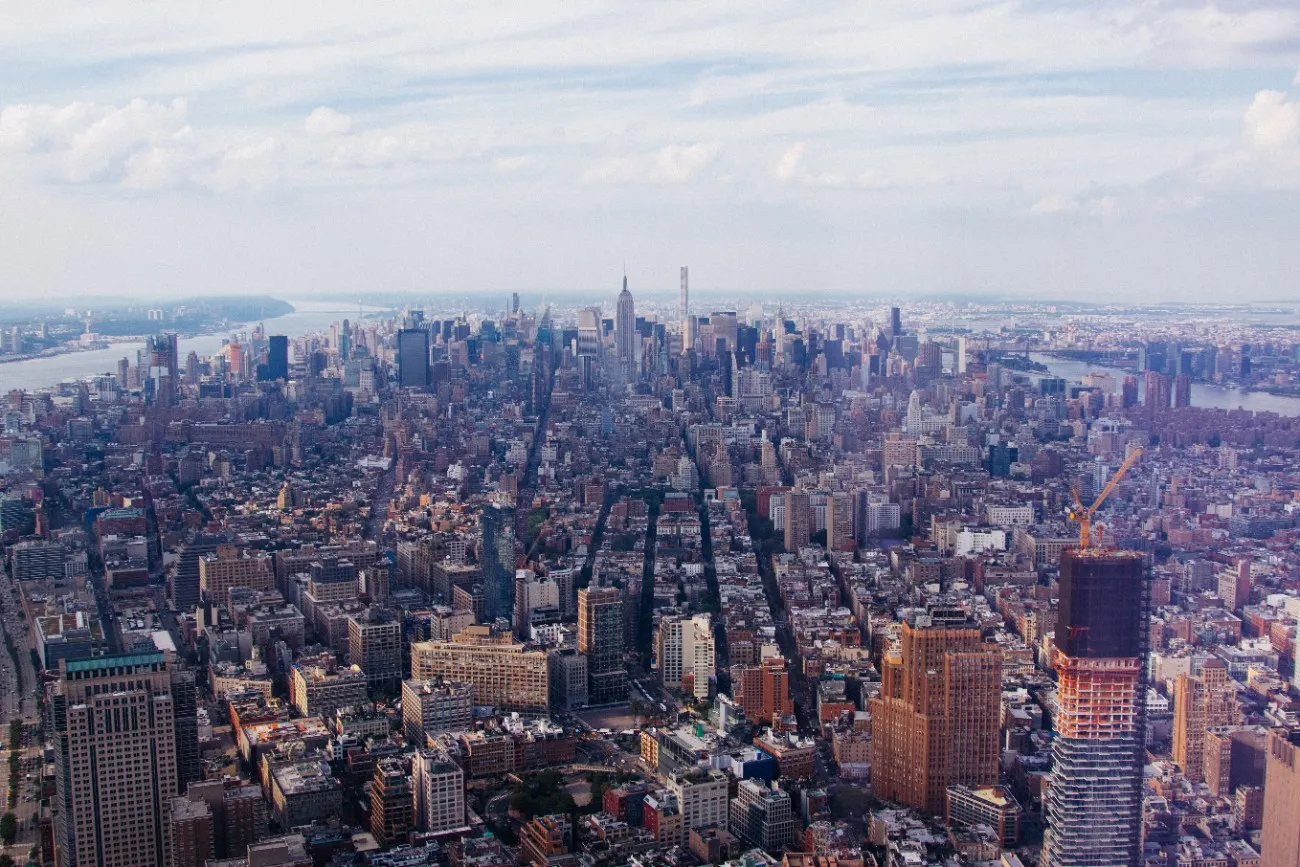 The expansive view from the One World Observatory in New York City
The expansive view from the One World Observatory in New York City
Edge, the cantilevered platform at Hudson Yards, provides a thrilling, seemingly “floating” experience with unique views of the west side. While visiting all of them might be redundant (and expensive), choosing one allows you to grasp the sheer scale and density of the city. Each deck has its own charm – Empire State’s historical significance, Top of the Rock’s perfect view of the Empire State and Central Park, One World’s modern height and poignant location, and Edge’s adventurous design.
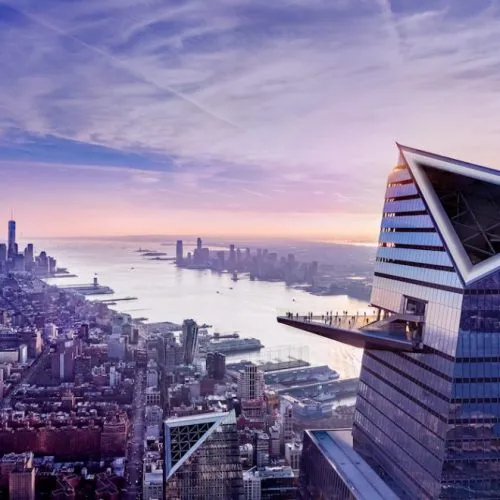 The distinctive cantilevered platform of The Edge observation deck
The distinctive cantilevered platform of The Edge observation deck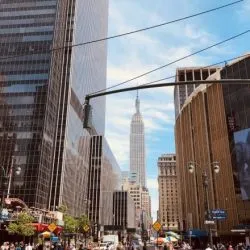 Modern architecture of Hudson Yards, including the Edge observation deck
Modern architecture of Hudson Yards, including the Edge observation deck
Edge, in my opinion, offers a particularly memorable experience due to its design and location near the High Line and Vessel. Standing out on that platform truly feels like walking on air, providing a unique and slightly exhilarating view of the city below.
The City’s Green Lung: Central Park
A sprawling oasis amidst the urban grid, Central Park is not just a park; it’s a vital part of New York life and a key feature among the top 5 new york attractions. Designed by Frederick Law Olmsted and Calvert Vaux, this National Historic Landmark is a masterpiece of landscape architecture, offering respite and recreation for millions. On a sunny day, the park comes alive with joggers, picnickers, street performers, and families enjoying its many facets.
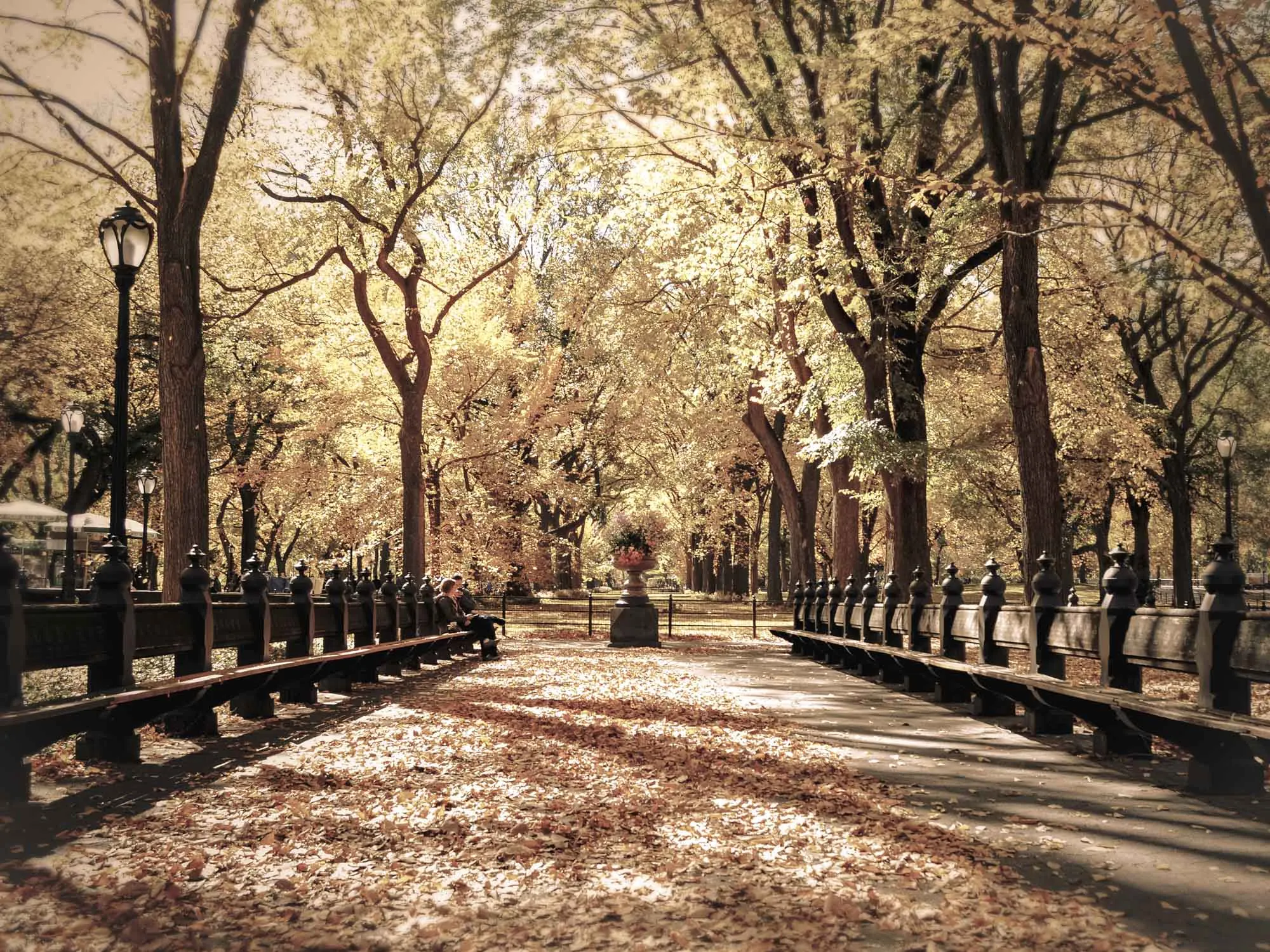 People walking along The Mall, a wide pedestrian path lined with trees in Central Park
People walking along The Mall, a wide pedestrian path lined with trees in Central Park
Exploring Central Park allows you to glimpse authentic New York life. You can wander through secluded areas like The Ramble, reflect at Strawberry Fields (the John Lennon memorial), admire the Bethesda Terrace, or simply relax on Sheep’s Meadow. The park’s beauty transforms with the seasons – vibrant in spring, lush in summer, colorful in fall, and magical when covered in snow in winter. Ice skating at Wollman Rink with the city skyline as a backdrop is a classic winter NYC experience.
While rain can dampen some outdoor activities, cold weather shouldn’t deter you. Central Park in the snow is enchanting, and there are cozy spots like the Boathouse or Tavern on the Green to warm up. It’s a place where history, nature, and city life converge beautifully.
Melting Pots of Flavor and Culture: Little Italy and Chinatown
One of the joys of exploring the best tourist attractions in NYC is discovering its incredible cultural diversity. Little Italy and Chinatown, located side-by-side in Lower Manhattan, offer a fascinating journey through distinct immigrant histories and vibrant contemporary life. These neighborhoods are sensory experiences, filled with the aromas of delicious food, the sounds of different languages, and colorful sights.
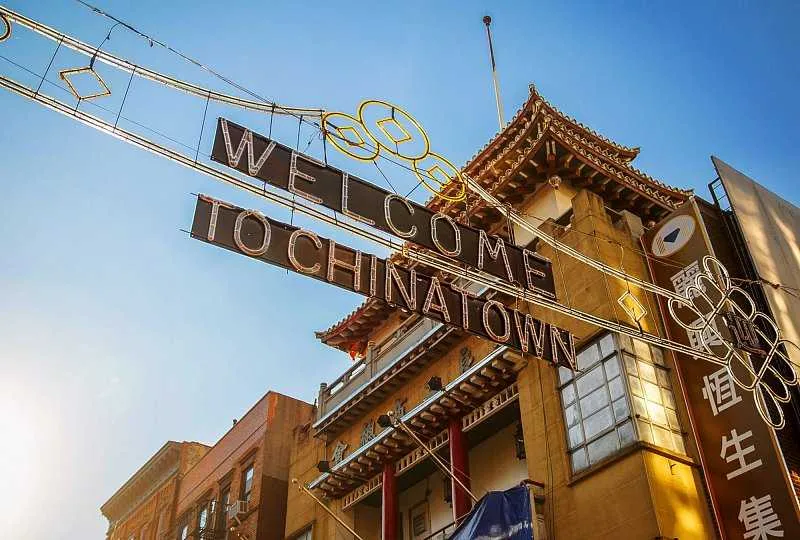 Sign welcoming visitors to Chinatown in New York City
Sign welcoming visitors to Chinatown in New York City
Little Italy, centered around Mulberry Street, evokes a sense of old-world charm, though its boundaries have shrunk over the years. It remains a popular spot for traditional Italian-American cuisine – think classic red-sauce joints, bakeries overflowing with cannoli, and gelato shops. Walking here feels like stepping onto a movie set, and annual feasts like the Feast of San Gennaro fill the streets with music, food, and celebration.
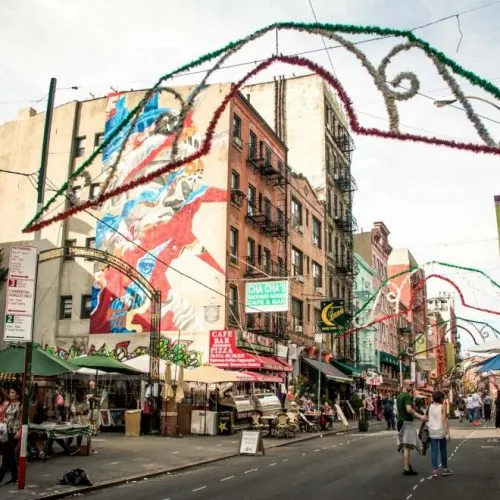 People walking through the lively streets of SoHo, Little Italy, and Chinatown
People walking through the lively streets of SoHo, Little Italy, and Chinatown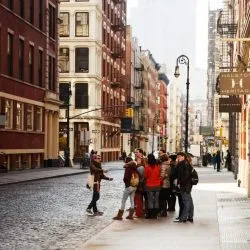 A street view showing a mix of signs and buildings in Chinatown
A street view showing a mix of signs and buildings in Chinatown
Cross Canal Street, and you enter the bustling world of Chinatown, one of the oldest and largest Chinese enclaves outside of Asia. This is a city within a city, with bustling markets, shops selling everything from traditional medicine to unique gifts, and an incredible array of authentic Chinese regional cuisines. From dim sum houses to noodle shops, the food scene here is a highlight, offering an authentic taste of Chinese culinary traditions shaped by the American experience. The contrast and proximity of these two distinct cultures is a testament to New York’s unique immigrant history. Nearby SoHo, with its cast-iron architecture and trendy boutiques, offers yet another fascinating neighborhood to explore in the same area.
A World of Art and History: The Metropolitan Museum of Art (The Met)
For art and history enthusiasts, the Metropolitan Museum of Art, affectionately known as The Met, is an unmissable destination and easily one of the best tourist attractions in NYC. Located on the edge of Central Park, it’s the largest art museum in the United States and home to a collection spanning 5,000 years of world culture, featuring over 2 million works. Stepping inside feels like entering a treasure trove of human creativity.
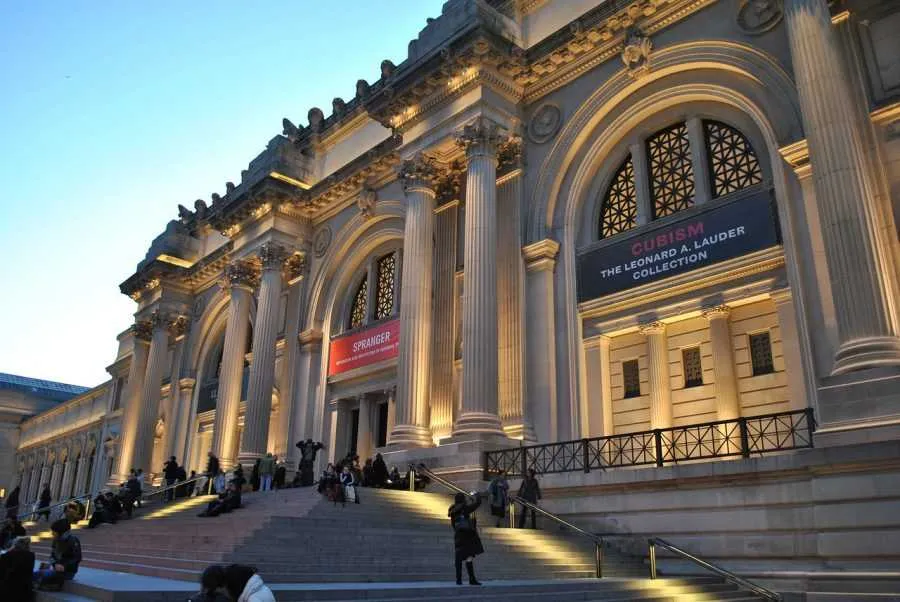 The grand facade of the Metropolitan Museum of Art on Fifth Avenue
The grand facade of the Metropolitan Museum of Art on Fifth Avenue
Exploring The Met can be overwhelming; you could spend days here and still not see everything. Highlights range from the Temple of Dendur and the Egyptian wing to the European paintings, the vast collection of costumes, and the impressive armor court. Each gallery tells a story, not just of the objects themselves, but of the civilizations that created them and the people who collected them.
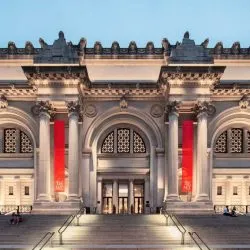 Interior view of a gallery inside the Metropolitan Museum of Art
Interior view of a gallery inside the Metropolitan Museum of Art
To make the most of your visit and uncover the most compelling stories behind the masterpieces and hidden gems, consider joining a guided tour. An expert can help navigate the vast halls and provide context that makes the art and artifacts truly come alive. The Met’s location near Central Park also makes it convenient to combine a cultural immersion with a relaxing afternoon outdoors.
Architectural Grandeur: Grand Central Terminal
Often underestimated as merely a transit hub, Grand Central Terminal is a magnificent Beaux-Arts building that stands as a testament to New York’s architectural ambition and historical significance, making it a standout among the top nyc tourist attractions. Opened in 1913, it serves hundreds of thousands of commuters daily but is also a destination in itself.
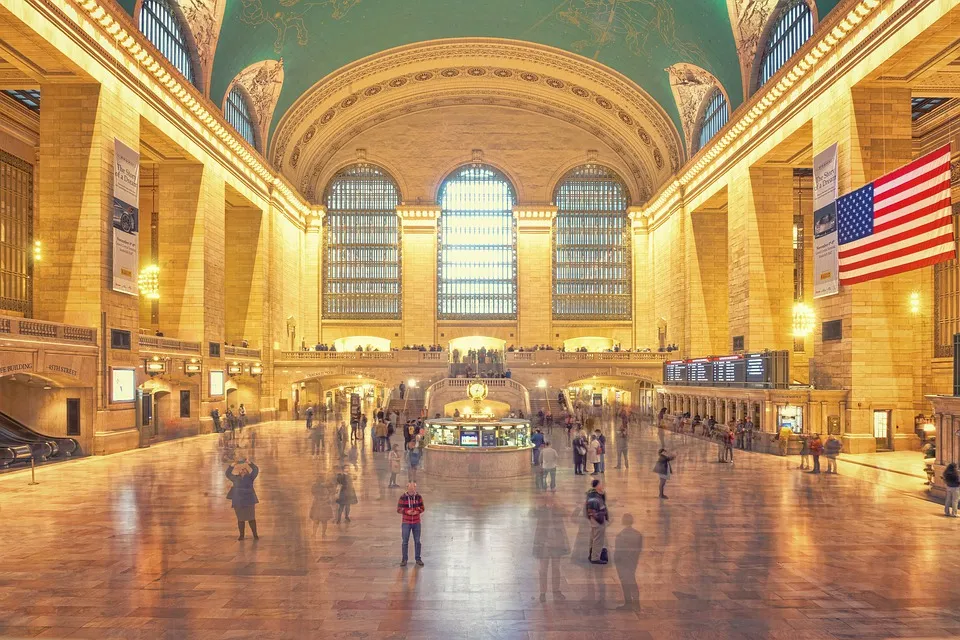 The stunning Main Concourse ceiling mural at Grand Central Terminal
The stunning Main Concourse ceiling mural at Grand Central Terminal
The highlight is undoubtedly the Main Concourse, a vast space with soaring ceilings, intricate details, and the famous celestial mural depicting constellations. The scale is breathtaking, and standing in the middle of the concourse, you feel the energy of the city moving around you while admiring the timeless beauty above. Don’t miss the Whispering Gallery near the Oyster Bar, where you can whisper into a corner and be heard clearly across the diagonal archway.
The exterior is equally impressive, with its monumental facade facing 42nd Street. Grand Central’s history is rich, having survived threats of demolition to be preserved as a landmark. It’s a place that perfectly embodies the city’s blend of constant movement and enduring grandeur.
An Elevated Oasis: The High Line
Transforming an abandoned elevated railway into a unique public park, the High Line is a shining example of urban renewal and a relatively new but highly popular addition to the best tourist attractions in NYC. Stretching for over a mile and a half along the west side of Manhattan, from the Meatpacking District to Hudson Yards, the park offers a linear green space high above the street level.
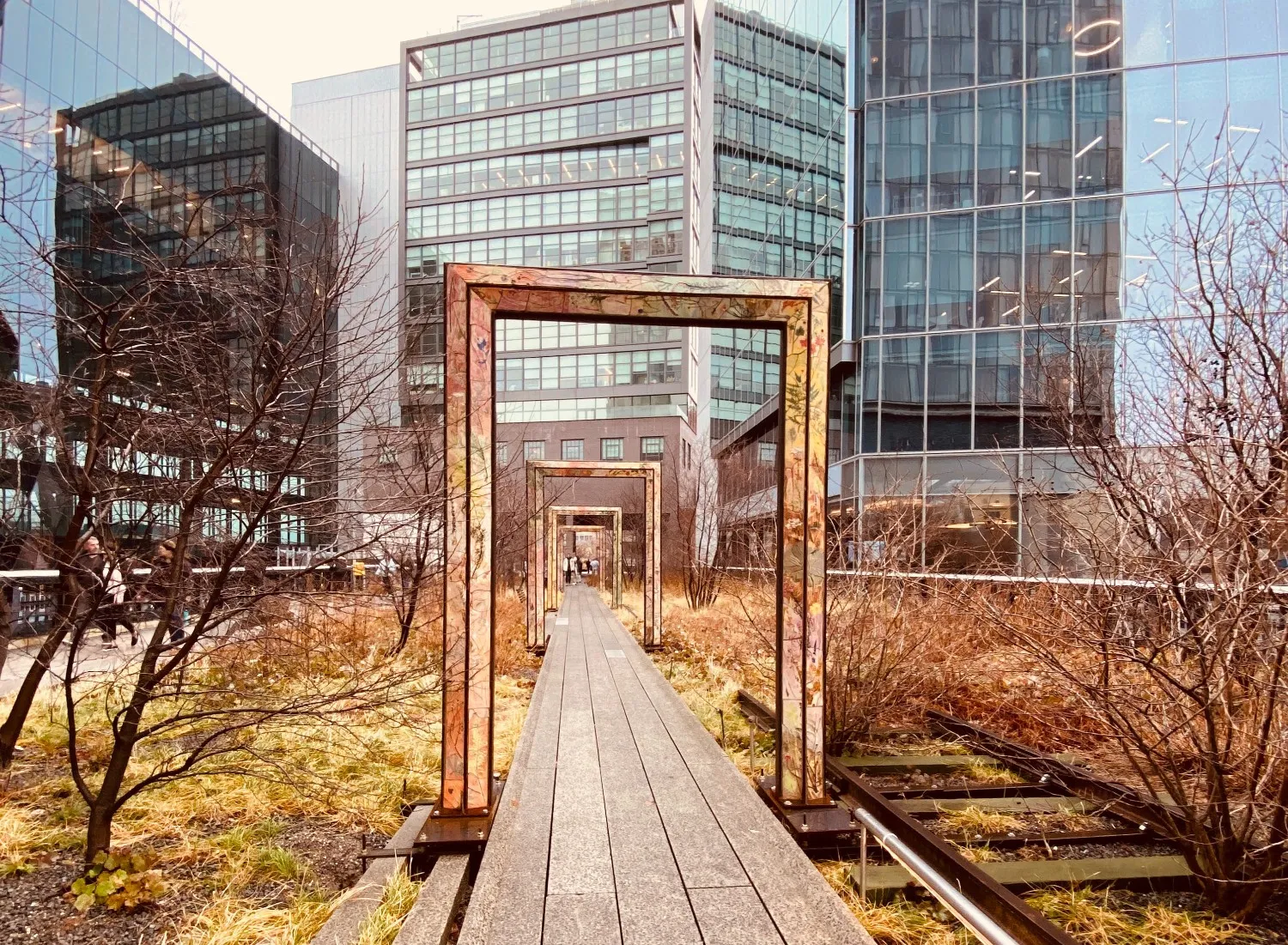 A view down the High Line park showing walking paths and plant life
A view down the High Line park showing walking paths and plant life
Opened in phases starting in 2009, the High Line cleverly incorporates elements of the original railway tracks and surrounding industrial landscape into its design. Walking along its paths, you’re surrounded by native plants and grasses, interspersed with public art installations, seating areas, and unique vantage points overlooking the streets, the Hudson River, and the cityscape. It’s a refreshing perspective on the city, offering a peaceful elevated stroll away from the street-level hustle.
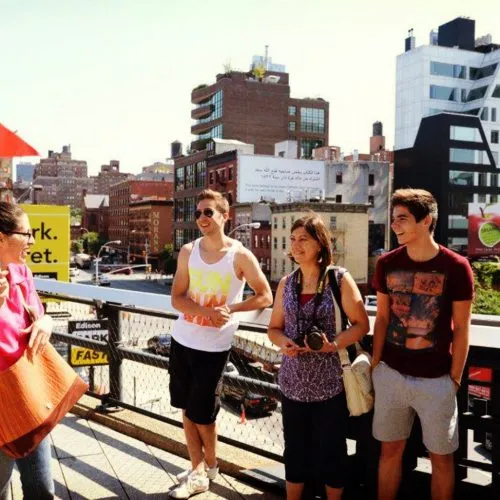 Visitors walking along the High Line park with urban buildings nearby
Visitors walking along the High Line park with urban buildings nearby Another view of the High Line park showing lush plants and seating areas
Another view of the High Line park showing lush plants and seating areas
The High Line also serves as a connector to vibrant neighborhoods like Chelsea, known for its art galleries (especially around 25th Street) and the famous Chelsea Market, a food hall housed in a historic factory building. A walk on the High Line often naturally leads to exploring these exciting nearby areas.
A Place for Reflection: The 9/11 Memorial & Museum
Visiting the 9/11 Memorial & Museum is a powerful and essential experience that offers a somber but important perspective on a pivotal moment in the city’s history. Located at the site of the former World Trade Center, this tribute honors the victims of the 2001 attacks and the 1993 bombing.
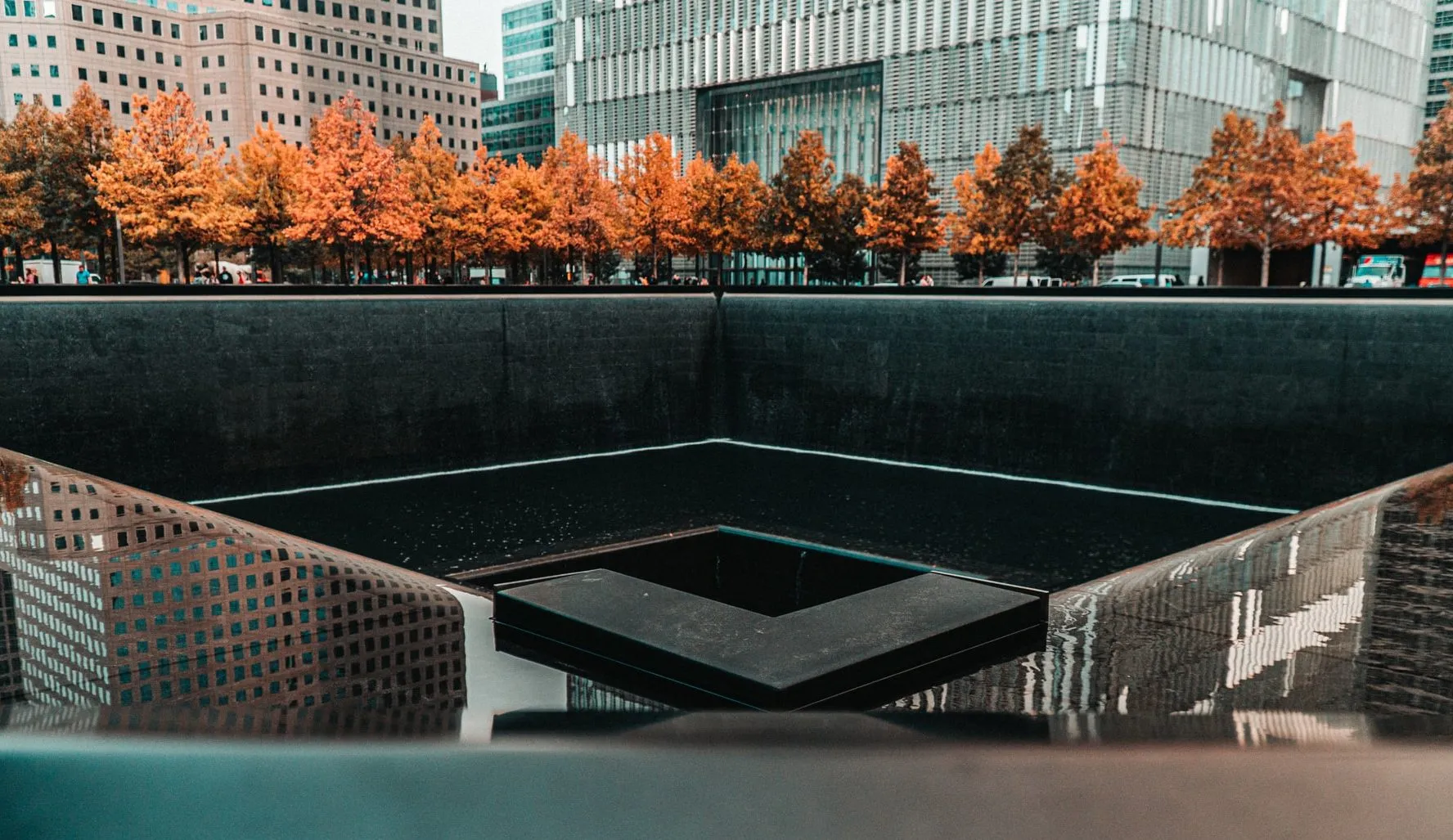 One of the twin reflecting pools at the 9/11 Memorial at Ground Zero
One of the twin reflecting pools at the 9/11 Memorial at Ground Zero
The Memorial features two immense reflecting pools set in the footprints of the Twin Towers. Waterfalls cascade into the pools, creating a constant, moving sound that encourages quiet contemplation. The names of every person killed in the attacks are inscribed around the edges of the pools, a poignant reminder of the human cost. It’s a space designed for reflection, resilience, and remembrance.
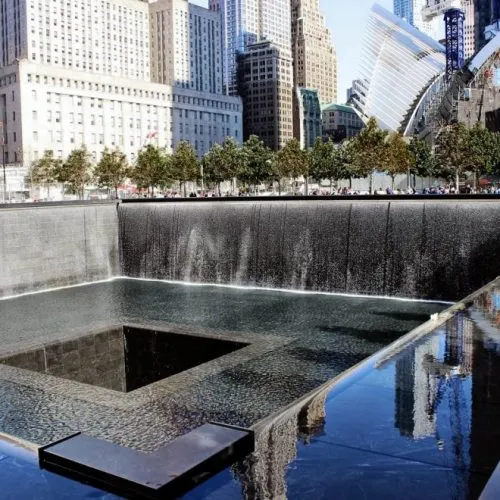 Exterior view of the 9/11 Memorial and Museum buildings
Exterior view of the 9/11 Memorial and Museum buildings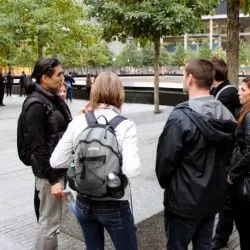 Another view of the 9/11 Memorial pools surrounded by trees
Another view of the 9/11 Memorial pools surrounded by trees
Adjacent to the Memorial is the 9/11 Museum, located within the archaeological heart of the site. The museum tells the story of 9/11 through artifacts, personal accounts, and interactive exhibits. It is an emotional but deeply informative experience that honors the victims, survivors, and first responders. Visiting the Memorial and Museum provides crucial context for understanding the resilience of New York City and its people.
History and Finance Converge: The Financial District
The Financial District, or “FiDi,” in Lower Manhattan might seem solely focused on banks and trading floors, but it is arguably the neighborhood with the richest history in New York City. It’s where the city began as a Dutch trading post (New Amsterdam) and the birthplace of American government.
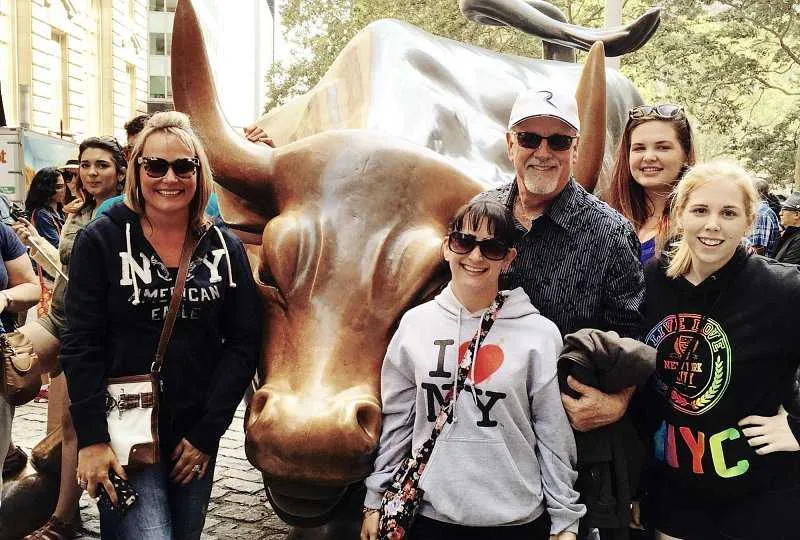 A family stands near the Charging Bull statue in the Financial District
A family stands near the Charging Bull statue in the Financial District
Beyond Wall Street and the New York Stock Exchange (impressive symbols of global finance), you can explore sites like Federal Hall, where George Washington was inaugurated as the first U.S. President, and Trinity Church, an active parish with a historic churchyard that is the final resting place for notable figures like Alexander Hamilton. Nearby Battery Park offers beautiful views of the harbor and is the departure point for ferries to the Statue of Liberty and Ellis Island.
The architecture in FiDi is a fascinating mix of old and new, from historic narrow streets like Stone Street (reminiscent of the Dutch era) to modern skyscrapers. Walking through this area, you feel the layers of history beneath your feet, witnessing the evolution from a small colonial settlement to a global financial powerhouse. It’s a dynamic neighborhood offering a blend of historical exploration and modern urban energy.
Vibrant Local Life: Greenwich Village, SoHo, and the West Village
To truly experience the pulse of New York beyond the major landmarks, exploring neighborhoods like Greenwich Village, SoHo, and the West Village is essential. While often grouped together due to their proximity, each possesses a distinct character and offers a glimpse into authentic NYC life, making them some of the best tourist places in new york for a deeper dive into local culture.
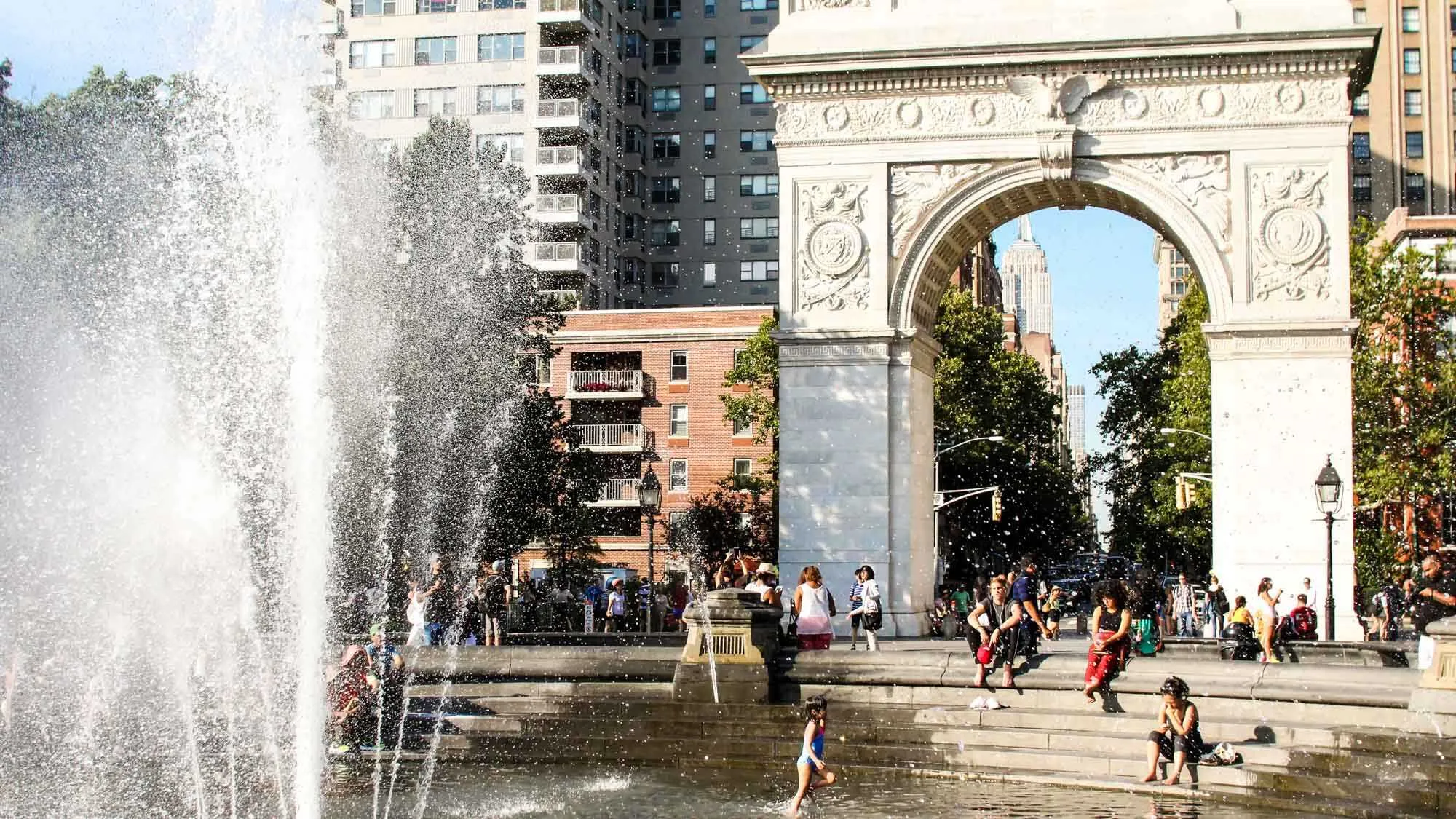 Fountain and arch at Washington Square Park in the Greenwich Village neighborhood
Fountain and arch at Washington Square Park in the Greenwich Village neighborhood
Greenwich Village has a rich history as a bohemian enclave and a center for counterculture movements. It’s home to Washington Square Park, a lively hub with street performers, artists, and students. The Village is filled with cozy cafes, jazz clubs, comedy venues, and independent bookstores, retaining a unique artistic and intellectual vibe.
SoHo (South of Houston Street) is famous for its stunning cast-iron architecture and transformation from an industrial area into a trendy shopping destination with high-end boutiques and art galleries. Walking its cobblestone streets, you admire the beautiful facades and soak in a chic, artistic atmosphere.
The West Village is known for its charming, winding streets (a contrast to Manhattan’s grid), beautiful brownstones, and intimate restaurants and bars. It feels more residential and quaint, offering a taste of upscale, quiet city living.
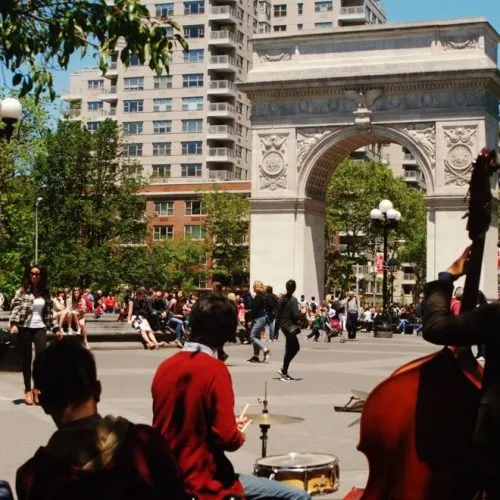 People walking on a street with historic buildings in Greenwich Village
People walking on a street with historic buildings in Greenwich Village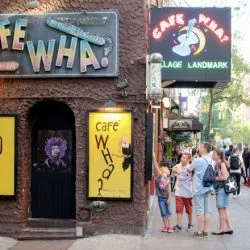 Another street view showing the charming architecture of Greenwich Village
Another street view showing the charming architecture of Greenwich Village
Each of these neighborhoods offers a different facet of local New York life, from browsing unique shops and enjoying diverse culinary scenes to simply soaking in the atmosphere of historic streets. Exploring them allows you to connect with the city on a more personal level, experiencing the daily rhythms and unique character that define NYC beyond its famous tourist spots.
New York City is an inexhaustible source of experiences. This list of the best tourist attractions in NYC is just the beginning, offering a mix of iconic sights, historical depth, cultural immersion, and local flavors. Each place has a story waiting to be discovered, a history to unfold, and a unique energy to absorb. Dive in, explore, and let the city reveal itself to you, one incredible attraction at a time.
